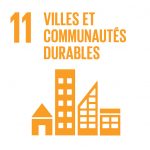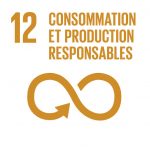Titre : Simuler et estimer les impacts des schémas innovants de logistique alimentaire en milieu urbain
Début de thèse : —
Fin de thèse : 2019
Résumé : Cet étude décrit la place des pôles logistiques alimentaire et leurs systèmes de distribution associés. Les déficiences des systèmes alimentaires qui ont conduit à l’émergence du concept des Food hubs et leur impact sur le développement urbain sont analysées. L’état de l’art sur le concept de Food Hub est présenté en premier lieu, puis une classification des différents types de Food hub est faite en se concentrant sur leur emplacement, zone d’influence et les acteurs impliqués ainsi comme l’analyse des impacts économiques, sociaux et environnementaux. Un case d’étude sur le système d’approvisionnement de nourriture pour la restauration collective est présenté avec une comparaison entre le modèle présenté et le concept du Food hub comme une alternative efficace pour nourrir la ville d’une manière durable.
Financeur : Projet Annona (ANRS)
Soutenance prévue : 17/07/2019
Mots clés : Food hub, Short Food Supply Chain, HORECA, Collective uses, City logistics, Sustainable Urban Food Distribution
Directeurs de thèse :
- Natacha GONDRAN : Maître-assistante à Mines Saint-Étienne, UMR 5600 EVS
- Jesus Gonzalez-Feliu : Maître-assistant à Mines Saint-Étienne, UMR 5600 EVS
Télécharger la thèse
Objectifs de développement durable concernés :


Publications
- This thesis addresses the research question of how demand requirements for eco-responsible and local products may impact the food supply distribution configuration. In other words, how to configure urban food systems to satisfy a demand for eco-responsible food products. Therefore, the purpose of this research is to explore how to estimate the relationship between a […]
- The production and distribution of Bienestarina to the vulnerable population of Colombia is one of the strategies of the Colombian Institute of Familiar Wellness (ICBF) to fight malnutrition, especially among children. This case is a good example of establishing food security and social improvement logistics that merits particular attention. The chapter presents an analysis of […]
- As described in the literature, the demand characteristics could influence the food distribution configuration. The aim of this paper is to explain how these demand characteristics can be used to describe the logistic requirements for food distribution configuration. With this aim, the chosen methodological approach integrates a literature review, interviews of stakeholders involved in the […]
- This paper presents a preliminary analysis of Urban Logistics Spaces (ULS) in Barranquilla, Colombia, with the aim of defining a typology in port cities in developing countries and examining the relevance of using a specific typology for those cities or having a unique and general typology, for any city in the world. Firstly, the background […]
- This paper proposes an assessment of the links between freight trip generation (FTG) rates and accessibility. First, the paper overviews the background, sets the context and motivates the research. Second, it presents the proposed methodology, which combines an FTG model, two accessibility indicators and a linear regression analysis to assess the relationships between freight trip […]
- This thesis addresses the research question of how demand requirements for eco-responsible and local products may impact the food supply distribution configuration. In other words, how to configure urban food systems to satisfy a demand for eco-responsible food products. Therefore, the purpose of this research is to explore how to estimate the relationship between a […]
- School feeding programmes are essential to face malnutrition in several countries. These programmes promote healthy feeding for children at the school-age; however, they have been suffering from distribution problems, mainly due to poor logistics infrastructure in many areas. One way to improve the distribution is to reduce the distance of the delivery routes. Thus, this […]
- Public authorities are increasingly interested in fostering short food supply chains. Starting by increasing the share of local and organic food in school canteens has a big potential but requires the redesign of the physical distribution system to make short food supply chains competitive and sustainable. Food Hubs (FH) have been identified in the literature […]
- Several City Logistics (CL) initiatives have emerged in the last two decades with the aim to reduce the negative externalities of freight distribution in urban areas. Such initiatives can be public and/or private but need to not break or impeach current operations efficiency so to not hinder their profitability. In order to provide business value […]
- […]
- […]
- […]
- Ever-growing urban areas and global population movement towards urbanization lead to major concerns regarding urban logistics and last mile operations. In Latin America, the problem becomes critical since volatile emerging economies and unstable political situations, which are common in the region, introduce additional limitations for strong logistics solutions. In the city of Quito (Ecuador), traffic […]
- The purpose of this paper is to identify which environmental criteria can influence the product demand in a context of business-to-business. These criteria can be related to the product's environmental characteristics, to the organization strategies or green practices developed by the firms and to the supplier selection process. Building the conceptual framework from the literature […]
- Ce rapport constitue le premier livrable du rapport CONCLUDE (CONception des Chaînes Logistiques avec Une Demande sensible à la performance Environnementale). Son objectif est d’identifier des critères de sensibilité de la demande par rapport à la performance environnementale à partir d’une revue de littérature. Nous avons dans un premier temps défini les notions de qualité […]